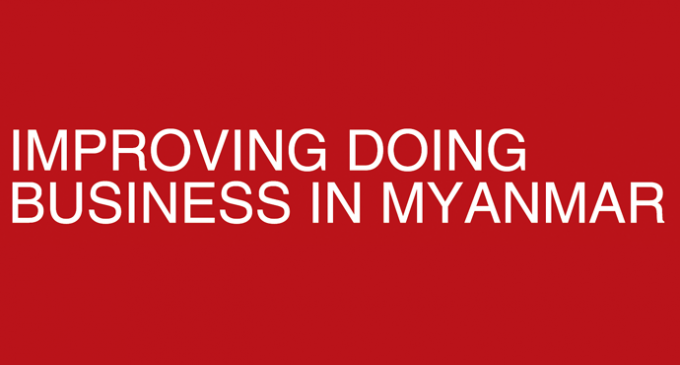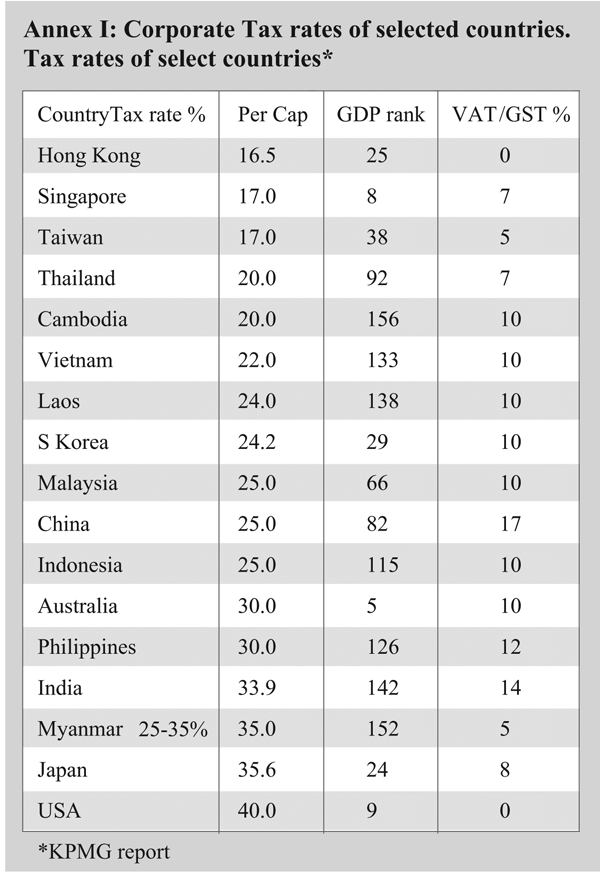IMPROVING DOING BUSINESS IN MYANMAR

Presented at the “Myanmar in Transition” seminar during the 50th anniversary of the Institute of Economics, Yangon, 30 November, 2014.
Than Tun (aka) Ashok Nath
Senior Research Fellow, Centre for Economic and Social Development, Myanmar Development Resource Institute.
( Conturned from last month….)
IV. NINE THINGS WE NEED TO DO TO OVERTAKE OUR NEIGHBOURS
There is a gap between our level of economic development and per capital income and that of most of our neighbours. All countries are improving their economic management and incentives. So if we do what everyone else is doing, we will no doubt improve our situation. But “THE GAP” between us and our neighbours will not be closed.
In order to close “THE GAP”, we simply must find our competitive advantages and/or define where we will build our advantage(s). Then (and only then) can we focus on a few areas than on many.These are matters of such national importance that each of the nine areas needs study and consultation. They are the seeds of a Myanmar Inc., “Corporate Strategy Document”. The following therefore is presented as items to think about, be studied, considered and refined.
1. Charge less taxes. What if we are bold enough to charge a corporate tax of 15% and ONLY on income generated from sales within Myanmar. We will then have the lowest tax rate in the region. Annex I gives the tax rates of select countries from a KPMG report. Hong Kong levies 16.5% and Singapore 17%. Less taxes attract more business. More business means more investments, more spending, more employment and in the end leads to more taxes not less.
By taxing only income generated in Myanmar, we are making it attractive for companies to make Myanmar their regional headquarters.
2. Consider (VERY limited) foreign land ownership. Allow condominuum ownership of 60% so that the amount can be more competitive than Philippines or Thailand. In general in Asia, a foreigner cannot own land. But if major improvements in the life, skills, productivity and well-being of the common man can be achieved, then why not set aside. 01% (total) of our land – for the best of all reasons – the common man.
For example, why not “bestow” a few acres of land ownership to the foreign company that will pour billions of money into a mass transit rail system for Yangon. Or to someone who will undertake a massive development in the 8th mile area to decongest Yangon? Or to those who will put up a perpetual educational foundation with billions of $ annuallyin grants for education of the poor?
Allowing on a very selective basis, a very small proportion of our land, to be owned by foreigners, will give us a competitive advantage. No one else does. It will help us to leapfrog and catch up if not overtake our neighbors. It will close “THE GAP”.
Our land should not be for the rich. Our land should not be for “national pride”. Our land should be for causes that will benefit the common man.
3. Concentrate on SME financing. As we have seen, they are many things countries do to support their SMEs. As a result, and in many (but not all) cases, resources are dissipated by trying to do everything. What the small business owner wants most of all is financing. Perhaps Myanmar can focus on this, and do a better job of it than anybody else. For example, the ADB recommends:
a. Non-bank financing schemes to supplement bank financing.
b. Capital markets for high-end SMEs and support for venture capital.
c. Professionals needed to promote SMEs’ access to finance.
d. Financial education.
Perhaps we should do all of the above? Maybe we should innovate with a Myanmar way to micro-financing as well?
4. Provide competitive FDI incentives. Some say that these incentives don’t really work. But most are convinced that they are necessary. We need to find and do something that others are not doing well enough. Reducing the corporate tax to 15% is a step in the right direction. A genuine “courtship” of foreign investment through various high level investment missions, may be necessary. Many foreign investors when asked what they would like, usually don’t ask for more incentives. They ask for: (a) rules not to be changed, (b) justice and (c) safety. If we want a competitive advantage, perhaps we can emphasize these three areas. Then we would be well on our way to catching up and overtaking some of our neighbours.
5. Improve World Bank “Doing Business” regulations drastically. This is not for the sake of ranking well – because what the businessman wants is not the ranking. The businessman wants to be able to start a business and run a business quickly easily and efficiently.
To this end, every business regulation should be pronounced guilty and put on trial for its life. Myanmar should allow business to start up online, in a simple easy one-stop manner. Our advantage is that we are only now starting out. So we can design a simple system.
6. National Skills and Productivity Institute. There is nothing that can help a country leapfrog its way to success than by improving the skills and productivity of its workforce. While higher education and the arts and sciences should be encouraged and continue, we should focus our attention and resources and give emphasis on technical and vocational education.
Special emphasis should be made for teaching the teachers. A program for train the trainer or teach the teacher is an investment we cannot afford not to make.
Singapore and Japan flourished by giving emphasis to these areas. Perhaps we can offer a 50% rebate to business that trains its employees. Singapore does this very well. The results speak for themselves.
The National Skills and Productivity Institute or Board, can start small – with just a few people, but with a lot of authority to generate funds, make rules and regulations, and encourage, help, and work with the private sector to improve skills and productivity.
(If we want to do everything on our own, we don’t have enough resources. And we don’t have the leisure of time either.Solet’s incentivize the private sector)
7. Permanent Civil Service School. We have to find ways to motivate and pay our civil servants better. This can be achieved if we implement, together with them, productivity programs, work simplification, 5S, and what have you. Productivity and service always leads to better pay.
We can also for example start with an amnesty. So its a clean sheet. Then we can move on to a values and goals program. Somehow we will need extensive training to show civil servants that they are indeed the servants of the people. And that more importantly, it is only with their cooperation that we can uplift the economic situation of the people.
No matter what we do, how hard we work or how clever our competitive positioning, it all goes to waste, and ends up naught, if it does not have the support of the civil service. As the saying goes, “bureaucrats do not have the will to make changes and improvements but have unlimited ways, means and wiles to keep the status quo”.
We need therefore to harness the strength and make the civil serviceREALLY responsive to businesss. We need change management programs, policies and procedures (using both carrot and stick) to make sure that civil servants carry water for the people, especially buiness.
If we can get our civil service to do this, we will become way ahead of many countries in the region. In other countries, they have to beg their civil servants to get things done. Myanmar will prosper if it can do otherwise.
For those who cannot change, we should treat with dignity, understanding and a good severance / retirement package.
A revamped Civil Service School – that teaches new skills, provides productivity black belts and incalculates the values of a civil servant, trains and retrains is a win win solution.
It won’t be easy. But it can be done. And if we can somehow manage to pull this off, then we would be leapfrogging our way to progress and development – ahead of many other countries.
8. English as the language of business. There is no question that we can generate a major edge and competitive advantage over China, Thailand or Indonesia and Taiwan, Korea or Japan if we make English the language of business. It could be side by side with Burmese. If an announcement were made and milestones properly set, that in 10 years from today English will be the lingua franca of business, then this alone would give Myanmar a competitive advantage – enough to leapfrog and overtake some of our neighbors. Tourism would boom even more. Call centers will florish. Regional offices of multinationals will be attracted.
9. Create a powerful Commission on Good Government to minimize Chronyism, Corruption and Protectionism (CCP). CCP starts with good intentions. Leaders want to rely on people they know to get the job done.
However, if we could somehow explain that the real ill of CCP is not a moral one. It is an economic one. CCP misdirects the use of resources. A nation like Myanmar that is just starting out, building its capital, trying to catch up with his neighbors, must make optimum use of its resources not waste them.
The experiences of planned economies like Russia and China has shown us that whenever a group of people interfere with the working of the free enterprise market economy, then there is no longer optimum use of resources. As a result, a few in power become rich, the majority of the population remain poor.
The reverse is proven to be true. Which is that a market economy (with minimum CCP) will assure the optimum use of resources which in turn would make the rich, the powerful as well as the common man, all better off than they were.
The experiences of protectionism shows us that it is not the industry that is protected. It is the oligarchs who own the industry. As a result, the rich are protected but not the common man.
The Commission on Good Governmentmust focus on prevention and education than on apprehension. It can be a small triumvirate but with broad powers. If for example the negative effects of CCP on the common man were made clear as an educational campaign, CCP will be reduced. There could be nationwide education campaigns organized by commission such as but not limited to:
• Myanmar is watching
• What happens when a job is given to a crony
• How protectionism does not protect
IN SUMMARY:
1. The goal of IMPROVING DOING BUSINESS IN MYANMAR is to improve the skills, productivity and standard of living of the common man. Perhaps we should put to the test, our laws, regulations, policies, thinking and actions on whether or not it improves the standard of living of the common man.
2. Business, both local and foreign, is the main engine of growth. We need to support them completely. Our thinking, policies, laws and regulations, and our re-education of the civil service needs to reflect this. The more we court foreign business, the better we be. Forigners cannot get rich at our expense. A case can be made that we get rich at their expense. On the balance, it’s a win-win situation.
3. Pick the battles we will fight and focus! Traditional approaches lead to traditional results. They keep “THE GAP” between us and our neighbors open. We can’t catch up and overtake them if our competitors are also racing ahead.Myanmar must do more, better,faster for business than our neighbours in order to close “THE GAP” between us.
It’s complicated. It’s not easy. A small task force is needed to find our competitive advantages and exploit them. Or to define what is the competitive advantages we will build.
Thank you.
./wp-content/uploads/2018/10/Emirate-Online-TDY.png)


















There are no comments at the moment, do you want to add one?
Write a comment